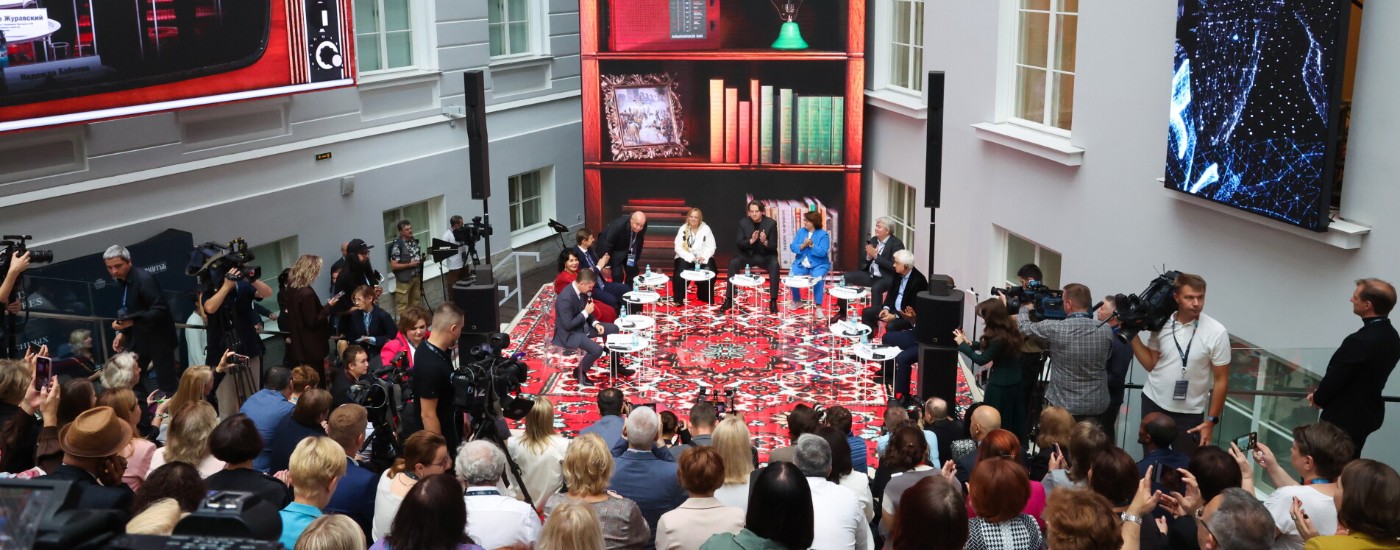At the X St. Petersburg International Forum of United Cultures, a panel discussion titled "Artificial Intelligence in Culture and National Sovereignty" took place.
Roman Karmanov, General Director of the Presidential Fund for Cultural Initiatives, moderated the session. The speakers discussed the integration of artificial intelligence (AI) in culture, IT development, and humans' role in using AI.
Participants in the discussion included Mikhail Shvydkoy, Special Representative of the President of the Russian Federation for International Cultural Cooperation and Artistic Director of the Moscow Musical Theatre; Konstantin Ernst, General Director of Channel One; Nadezhda Babkina, People's Artist of Russia, politician, and public figure; Alexander Zhuravsky, Deputy Chief of the Presidential Directorate for Social Projects; Alexey Goreslavsky, General Director of ANO IRI; Louis Gowend, President of the Cameroonian Diaspora in Russia and member of the Presidium of the Union of African Diasporas in Russia; Hans-Joachim Frey, Artistic Director of the Sirius Cultural Center; Olga Uskova, entrepreneur and president of Cognitive Technologies; and Svetlana Balanova, General Director of the National Media Group.
Before the session began, People's Artist of Russia Nadezhda Babkina performed the song “My Motherland” alongside a unique singing robot, demonstrating a blend of traditional art with modern technologies. The song was created within the framework of the "We Believe in Russia" project, supported by the Presidential Fund for Cultural Initiatives.
The experts unanimously agreed that the development of artificial intelligence in culture is crucial for technological sovereignty, but the process must be controlled to avoid harm. AI's thinking is shaped by the data it is trained on, and it reflects the values and perspectives of its country of origin, including differing concepts of what is "good" and what is "bad."
"Whether we like it or not, artificial intelligence will continue to develop. AI exists precisely to offer suggestions, propose topics, and guide us on how to move forward and learn. <…> We must experiment with it. If we don't try, we won’t progress, and others will embrace it to our detriment," emphasized Nadezhda Babkina, People's Artist of Russia.
Mikhail Shvydkoy noted that AI's development brings many challenges not only in ethics and jurisprudence but also in culture:
"We must understand that AI development creates many ethics, law, and climate issues. <…> The mere fact that AI is now being used in creativity and is becoming a tool for creative work is already a significant phenomenon. We used to think AI would only be implemented in routine human activities. But it turns out that it is actively entering areas that have traditionally been the domain of humans," Shvydkoy explained.
Despite AI’s vast potential, it cannot replace humans in culture. Konstantin Ernst pointed out that while technology brings immense possibilities, it also poses great dangers:
"There are enormous opportunities and significant risks. The main difference between human intelligence and AI is that we don't fully understand how the human mind works. And we don't know how talent exists. How do people compose genius music or write brilliant prose? We don’t know how to teach a computer what we don’t understand ourselves. We’re at a stage where we can teach networks specific things, and they can learn them. <…> First, banning science is impossible. It will advance in some form, legally or illegally. Instead, we must control the process to ensure it does not harm," Ernst stressed.
Alexey Goreslavsky, General Director of ANO IRI, noted that attention to artificial intelligence and the assessment of its dangers is still at a household level. In his opinion, existing technologies are currently in their infancy and are safe, useful, and help accelerate certain processes.
"What AI will never achieve is humor. I have yet to see a single AI system that can create something funny. Humor comes from the writer, from the person who crafts jokes. This is one of the things that still distinguishes humans from artificial intelligence," Goreslavsky remarked.
Louis Gowend, President of the Cameroonian Diaspora in Russia and member of the Presidium of the Union of African Diasporas in Russia emphasized that Africa is culturally rich, and AI can help preserve and showcase this wealth. Technologies, for instance, allow for the restoration of paintings, translating texts into national languages, and preserving African music and oral traditions. Digital artists use software and digital tools to create complex patterns and designs inspired by African motifs.
"For us Africans, artificial intelligence is an opportunity to catch up with development because we face many issues related to the continent's progress. <…> However, we also have limitations that hinder AI usage. In Africa, 1.5 billion people live there, but only about 22% on average have internet access. <…> I see enormous potential in AI for fostering cooperation and development," Gowend emphasized.






